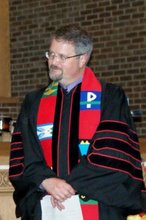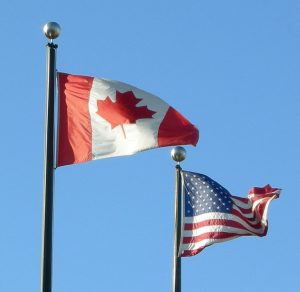I’ll be blogging here so I’ll introduce myself. My name is Brandon Daniel-Hughes and I’m a Liberal and an Evangelical. That reads a bit like a confession or an introduction at a self-help group. Maybe that’s appropriate.
I am taking this opportunity to introduce myself, not because I think I’m particularly unique in my Christian convictions, but rather because I’m convinced that I’m not. I’m convinced that I’m very much in the center of the church in America, but that you would never know it if you read, listened to, or watched most Christian publications. And I’m convinced that I’m not alone. I can’t prove it, but it’s a hunch based on plenty of anecdotal evidence.
In the weeks and months to come I’m sure I’ll tell you more about myself, but for now I want to emphasize my motivations for working with LiberalEvangelical.org and our directors. You can find out more about us by visiting the LE Info page. But one thing I think you deserve to know about me up front is that I don’t fit in with either the liberal or the conservative wings of the American church. I am desperate to find another option.
The first time I was old enough to vote in an American presidential election, I voted for Bob Dole. The next time I voted for President, I voted for Ralph Nader. The last time I voted for President, I voted for the Libertarian candidate whose name I can’t remember, but had I not been living in Massachusetts, which was sure to go for Kerry anyway, I’d have voted for John Kerry.
A month or so ago when Hillary and Obama were still battling for the Democratic nomination, my wife and I both took one of those online “candidate match” tests, where they ask you thirty or so questions and then tell you who your ideal candidate is. I was cooking dinner so she read me the questions and I gave her answers, but when she hit the “match” button at the bottom of the page she nearly fell out of her chair. My ideal candidate was Kent McManigal, the Daniel Boone type radical Libertarian. I’ll spare you the link to candidate site, but if he’s on the ballot his November I think I just may vote for him.
The thing is, I’m not crazy or inconsistent. I don’t bounce between two political poles, unable to make up my mind. I have definite political opinions and ideals, but neither of the two viable political options ever fully embodies those ideals, so I end up voting based on who I think will least violate the freedoms and ideals that I value. “Though this be madness, yet there is method in it.” Sometimes it’s a Democrat, sometimes it’s a Republican, nearly always it’s a moderate, and sometimes, it’s Kent McManigal and his Kentucky long rifle
The idea I object to is the notion that because I do not gravitate toward either end of the political spectrum, my political ideas must be either ill formed or loosely held. This kind of thinking misses the very point of naming the political spectrum a “spectrum.” Most of us are not radical liberals or knee-jerk conservatives. Most of us are somewhere in the middle. We’re what the pundits call the “purple people” denizens of neither the blue nor the red state mindset.
Come to think of it, I’m not even “in the middle.” This assumes that the range of possible political views is wholly defined and determined by the entrenched parties at either end of the particular spectrum that we happen to have. The “middle” isn’t some wasteland of misbegotten or naive citizens and theories, as if the only coherent positions where at the extremes. The endpoints should not determine the identity and priorities of all the parts of the whole. So, while it may serve as a convenient shorthand to refer to the political opinions of a particular voter or candidate as “moderate conservative” or “left of center”, these titles should not be taken as wholly defining the individual and her or his ideas.
Commonsense resides in the middle, or better yet, at the center of our political life. The political moderates are not schizophrenic. We simply refuse to heed the Siren’s call toward the dangerous rocks of ideological purity.
Politically that is who I am. However, as uncomfortable as it may be to live, breathe, and think in the political center, when it is time to vote I enter a booth, pull a curtain and am alone with my decision. It’s just me and my ballot.
For me, it is far less uncomfortable in the political center than it is in the ecclesiastical center. In most political contexts being called a “moderate” or a “centrist” is a compliment. Not so in the church today. The conservatives call us “cafeteria Christians,” “lukewarm,” “cultural Christians,” “backsliders,” “accommodationists,” and “assimilators.” (As if moderation were the Borg of Christian space!) The Liberals, while they have fewer names for us, can be equally disdainful when they mock our full throated worship as “enthusiasm” and “emotionalism” or condescend to our Jesus talk as they wait for us to get down to the real work of social action. Political moderates at least have the opportunity of turning off the talk radio and avoiding the political rallies. The sanctity of the secret ballot ultimately preserves anonymity. But we Liberal Evangelicals do not worship, serve, pray, teach, sing, argue, and preach behind a voting booth curtain. We do all of these things in churches that are sometimes polarized and politicized places. We seek to follow Christ in public and this opens us to the eyes and barbs of the liberals and the conservatives in the churches.
The situation in the American church is much more complex than the political situation in part because the Whig Party, Bull Moose Party, Federalists, and Secessionists have largely disappeared, while the number of denominations continues to grow. It is also complicated by the presence of Orthodox, Mormon, Protestant, and Roman Catholic Christians, Conservative, Reformed and Orthodox Jews, Shiite and Sunni Muslims, Mahayana and Theravada Buddhists, Sikhs, Hindus, Taoists, Confucians, Native American traditions, Unitarians and Tom Cruise.
We are a diverse nation and a diverse church. But, despite this obvious diversity, many in the Christian church continue to understand our churches, congregations, social action, and theologies as arrayed against one another at opposite ends of a single spectrum. The “battle for the soul of the church in America” works to draw up clear battle lines. Is a fetus a human being or not? Is the plain text meaning of every Bible verse true or not? Is the death penalty evil or not? These battle lines render neutrality and nuance non-options. Both sides, the far left and the far right, are heavily invested in this particular picture of our situation. And both sides tend to argue that every person is either with them or against them. This understanding of the church today has the benefit of clarity and simplicity for those who fit neatly in either camp, but it is wrong both morally and as a picture of the living church.
The real mystery – and this is part of what the Liberal Evangelical project is about – is why we let this happen. Why do the majority of us who inhabit the center, and who do not understand our Christian lives primarily as battles against ecclesiological and theological enemies, allow the “battle” metaphor to prevail? I’m not asking, why don’t we fight back? I’m asking, why don’t we more often challenge the idea that Christian life is primarily a fight? Why don’t we reject this simplistic characterization of the church in America? Why is it so hard to make the case for moderation? Why are progressive Christian moderates continually drafted or drawn into a battle that they don’t think needs to be fought? As we native Kentuckians say, “I got no dog in that fight.” And yet, I’m continually drawn in.
I can feel it in my posture. When I’m among my friends from a congregation that is open to and affirming of gay and lesbian couples, I feel myself pulled into simplistic caricatures of bible thumping Evangelicals. I nod and laugh sympathetically. And when I’m with my friends from a thriving Pentecostal church that shakes the rafters with shouts and sermons, I feel the pull of their disdain for the secularized sellouts in the mainline churches. I furrow my brow and “mmmm” in agreement. If either side knew that I sympathized with the other, would they be shocked or angered? If either side knew that I identified with the other, that I am a Liberal Christian and an Evangelical Christian, would they feel betrayed? I’m sure that some on both sides would.
But I’m hopeful that many would secretly be glad. Some would wait, as some have waited, until coffee hour to have a private chat about a compelling book on historical criticism they had read. Others might send, as others have sent, an e-mail asking about my conservative upbringing and requesting advice on how better to communicate with conservative Christian relatives with whom they want a closer Christian bond. Others might strike up, as many that I have been blessed to meet over the past decade have struck up, a friendship based on shared stories and the conviction that our Evangelical and Liberal impulses are not arrayed against each other on opposite sides of a political divide. Somehow, these convictions complement one another. I’m hopeful that there are many more of us out there, progressive Christians who are looking for ways to get out from under the rhetorical umbrella of the warring parties on the theological extremes and get on with the business of following Jesus.
I haven’t done a great job of introducing myself here, I realize, but my commitment to Liberal and Evangelical Christianity is more germane than my favorite musician and favorite book. [For the record, I usually tell people it’s Bill Monroe and Zola’s Germinal, but if this blog is going to work it shouldn’t start with a lie. It’s Willie Nelson and Arthur C. Clarke’s Rama series.] Ultimately, this blog is for me, because I’m not yet sure how to get beyond the pull of the battle metaphor and I need a community of other progressive Christians who want to honor both the Evangelical and the Liberal voices in the Christian Gospel. If you are glad to know that there are others out there who struggle to live in the Christian middle that can sometimes feel like a no-man’s-land, then this blog is for you as well, because the way to make the center feel less like a no-man’s-land is find others there beside you. So I’m here in the middle, as are the LiberalEvangelical.org project directors and the many people who will be contributing in the coming weeks and months. We have a hunch we’re not alone.
If you’re in the right place, welcome. I am glad we have found each other.



